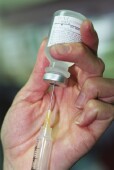
THURSDAY, July 24, 2014 (HealthDay News) — An “unacceptably low” number of girls and boys are getting the human papillomavirus (HPV) vaccine, which protects against cervical, anal and other cancers, U.S. health officials said Thursday.
The U.S. Centers for Disease Control and Prevention recommends all boys and girls aged 11 and 12 get the three-dose vaccine so that protection is in place before they become sexually active.
Yet, despite a slight increase over the year before, only 57 percent of girls and 35 percent of boys aged 13 to 17 have had one or more doses, the CDC said based on results of a 2013 survey.
And only one-third of teen girls have received all three doses of HPV vaccine, according to the survey covering more than 18,000 teens.
Dr. Anne Schuchat, director of the CDC’s National Center for Immunization and Respiratory Diseases, said, “Today I wish I had good news, but what I need to report is a small increase in HPV vaccinations.”
“It is a relief that we did not continue to have flat-lining HPV coverage in 2013. You may recall that there was absolutely no improvement from 2011 to 2012,” she said during an afternoon news conference. “The increase [in 2013] we did see was small at the national level. We were disappointed at the overall finding.”
Fred Wyand, a spokesman for the American Sexual Health Association, said, “Among all childhood vaccines, HPV is sort of the new kid on the block.”
This vaccine works well and is safe, Wyand said. “But we don’t think of this as a routine checklist item, the way we do with other vaccines . . . That will come in time,” he said.
High-risk HPV strains cause virtually all cervical cancers, according to the U.S. National Cancer Institute. They also cause most anal cancers and some vaginal, vulva, penile and oral cancers.
If girls had one or more doses of HPV vaccine before their 13th birthdays, 91 percent would have some protection from cancers caused by the sexually transmitted virus, according to the analysis, published in the July 25 issue of the CDC’s Morbidity and Mortality Weekly Report.
Parental concerns are one obstacle, the researchers found. When asked why they hadn’t had their son or daughter vaccinated, parents said their doctor didn’t recommend the vaccine, that they had concerns about the vaccine’s safety or that their children were not sexually active.
“We find that when we talk to parents about vaccinating their children, they think you are saying it’s OK to have premarital sex,” said Dr. Eric Genden, a professor of otolaryngology at Mount Sinai Health System in New York City.
There also is some fear of vaccinations because of the now widely debunked claim linking vaccines to autism, he said.
The CDC believes HPV-vaccine coverage would dramatically increase if doctors recommended the HPV vaccine along with other routine immunizations. The agency pointed out that nearly 86 percent of teens have received one dose of the tetanus, diphtheria and pertussis (Tdap) vaccine, indicating the opportunity for broader HPV vaccination exists.
Three-quarters of parents who had their daughters vaccinated against HPV said their doctor had recommended it compared with 52 percent of parents who didn’t have their daughters vaccinated, the researchers found.
For boys, 72 percent of parents who had their sons vaccinated did so on their doctor’s advice while only one-quarter of parents who hadn’t had their sons vaccinated said the doctor had recommended the vaccine.
Some parents think “my child is not at risk for STDs, so this isn’t really applicable to us,” Wyand said. “But we know that everybody is at risk for STDs, especially HPV.”
The two HPV vaccines available in the United States are Cervarix and Gardasil. Both protect against cervical cancers in women. Gardasil also protects against genital warts and cancers of the anus, vagina and vulva. Both vaccines are available for girls, but only Gardasil is available for boys, according to the CDC.
The Affordable Care Act has removed cost as a barrier to getting vaccinated, Genden said, noting HPV vaccine is covered by insurance.
More information
For more about the HPV vaccine, visit the U.S. Centers for Disease Control and Prevention.
Copyright © 2026 HealthDay. All rights reserved.

